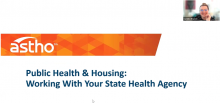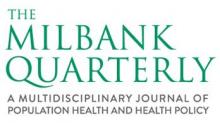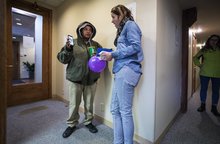Found 145 resources.
0
0
0

Building and maintaining effective community partnerships is a critical component of health center management and community involvement. Local partners help integrate important stakeholders into organizational processes and empower health centers to better understand and care for the communities they serve. But can health centers design and evaluate their partnerships? In this webinar, we reviewed tools and procedures for designing, evaluating, and strengthening community partnerships with a focus on pragmatic, practical and innovative solutions.
Topics: Health, Housing, Partnerships
 Shared by Camille Anoll-Hunter
on Aug 8, 2023
Shared by Camille Anoll-Hunter
on Aug 8, 2023 0
0
0

Please join us for a time to hear from PHA leaders and industry professionals on key cross-sector topics of interest. This month will focus on strategies for working with your health department including presentations from those in the field and tips from your fellow PHAs already doing the work.
Topics: Health, Housing Is Working Group, Medicaid / Medicare, Partnerships
 Shared by Sandra Ware
on Apr 13, 2023
Shared by Sandra Ware
on Apr 13, 2023 0
0
0

Poor maternal and child health (MCH) outcomes and rates of chronic disease are persistently high in the United States and concentrated in rural and service-deprived areas where local health departments provide most care. In a new Milbank Quarterly study, Taryn A. G. Quinlan, Amelia L. Mitchell, and Glen P. Mays of the Colorado School of Public Health use national survey data from 630 local health departments to understand the relationship between social service collaboration and the provision of direct MCH services, such as the Special Supplemental Nutrition Program for Women, Infants, and...
Topics: dual-generation initiative, Early childhood, Health, Low-income, Partnerships, Research
 Shared by Sandra Ware
on Feb 7, 2023
Shared by Sandra Ware
on Feb 7, 2023 0
0
0
This toolkit by NCHPH and NNCC provides information and resources for health center staff to partner and collaborate more effectively with their local housing authorities and with other providers serving residents of public housing and other low-income housing.
Topics: Health, Partnerships
 Shared by Camille Anoll-Hunter
on Sep 23, 2022
Shared by Camille Anoll-Hunter
on Sep 23, 2022 1
0
0
The Administration for Community Living’s Aging and Disability Network is a multifaceted service infrastructure for older adults and people with disabilities so they can find housing and obtain services like chore assistance, delivered meals, and transportation. By partnering with this community infrastructure, PHAs can improve voucher utilization and leverage and align resources so older adults, people with disabilities, and people experiencing homelessness —all priority populations for federal housing assistance—can obtain supportive services needed to attain housing stability, optimize...
Topics: Advocacy, Community development, Disabilities, Health, Housing, Partnerships, Research, Seniors, Supportive housing, Sustainability
 Shared by Karina George
on Jun 17, 2022
Shared by Karina George
on Jun 17, 2022 0
0
0
Roundtable: Cross-Sector Efforts on COVID-19.
More than a year into a global pandemic, we continue to see disparities in infections, access to care, and economic supports, with an unequal burden on low-income and communities of color. This roundtable will discuss perspectives from housing, health, and policy for what we have seen and what may be to come, as well as ideas we may enact to create more permanent solutions, in addition to addressing current crises.
Topics: CLPHA, Community development, COVID-19, Education, Health, Housing, Partnerships
 Shared by Housing Is
on May 18, 2021
Shared by Housing Is
on May 18, 2021 0
0
0
How Housing Programs Can Support the Educational Needs of Children Living in Publicly Supported Homes
Topics: Attendance, Broadband, Child welfare, Early childhood, Health, Housing, Literacy, Low-income, Out-of-school time, Partnerships, Place-based, Research, School-readiness
 Shared by Kelly McElwain
on Nov 7, 2019
Shared by Kelly McElwain
on Nov 7, 2019 0
0
0

Trends in Housing Assistance and Who it Serves
Topics: Community development, Disabilities, Education, Funding, Health, Homelessness, Housing, Legislation & Policy, Low-income, Partnerships, Research, Seniors, Workforce development, Youth
 Shared by Keely Stater
on Sep 10, 2019
Shared by Keely Stater
on Sep 10, 2019 0
0
0

A more regional approach to care is needed – one that involves coordinated, person-centered healthcare with robust connections to social services and community resources. An innovative infrastructure to do just that is underway in four communities across New Jersey: Trenton, Camden, Newark, and Paterson. Efforts begun in 2011 under New Jersey’s Medicaid Accountable Care Organization (ACO) Demonstration Project have evolved into four regional collaboratives that integrate, coordinate, and align all the disconnected programs aimed at making communities healthier.
Topics: Data sharing, East Coast, Health, Partnerships
 Shared by Housing Is
on Jun 13, 2019
Shared by Housing Is
on Jun 13, 2019 0
0
0
The articles below are part of a special collection commemorating 25 years of the Health Care System Research Network’s (HCSRN's) rigorous research to improve health outcomes and health systems’ performance by leveraging electronic health data. This new collection highlights, among other things, advances in personalized cancer care, the optimal use of AI in health care, and the evolution of common data models, featuring work from Kaiser Permanente, Intermountain Healthcare and others.
Topics: Data sharing, Health, Partnerships, Research
 Shared by Housing Is
on Jun 13, 2019
Shared by Housing Is
on Jun 13, 2019 0
0
0
In 2011, Cleveland had one of the highest rates of childhood lead poisoning in the United States, with almost one of every five children in the city receiving this diagnosis. Childhood asthma rates were also extremely high, especially for children living in poverty, according to 2008 statewide statistics for Ohio. Follow along in this new case study with the Engaging the Community in New Approaches to Healthy Housing (ECNAHH) initiative, part the BUILD Health Challenge’s first cohort, as they worked to reduce the occurrence of asthma, chronic obstructive pulmonary disease (COPD), and lead...
Topics: Health, Midwest, Partnerships, Research
 Shared by Housing Is
on Jun 13, 2019
Shared by Housing Is
on Jun 13, 2019 0
0
0
An interview with Emily Yu, MBA, the Executive Director of the BUILD Health Challenge, an All In partner initiative that supports local collaborations between community-based organizations, health departments, and hospitals/health systems that are working to address important health issues in their communities.
Topics: Data sharing, Health, Partnerships
 Shared by Housing Is
on Jun 13, 2019
Shared by Housing Is
on Jun 13, 2019 0
0
0
It’s a prescription guaranteed to develop healthy brains, refine motor skills and prepare kids for school, doctors say. But few parents expect a physician to hand their children a book at their first wellness checkup at Nationwide Children’s Hospital in Columbus.
Topics: Child welfare, Early childhood, Education, Health, Literacy, Low-income, Partnerships
 Shared by Housing Is
on May 30, 2019
Shared by Housing Is
on May 30, 2019 0
0
0

With ever-growing interest in the intersection between housing and health, researchers are evaluating the impact of cross-sector interventions. This session will bring together researchers to share insights from their work relevant to practitioners and policymakers.
Topics: CLPHA, Health, Homelessness, Housing, Low-income, Partnerships, Research, Seniors
 Shared by Housing Is
on May 24, 2019
Shared by Housing Is
on May 24, 2019 0
0
0

Building Internal PHA Capacity for Cross-Sector Partnerships: How to creatively expand and enhance internal capacity to support cross-sector partnerships.
Topics: CLPHA, Education, Health, Housing, Partnerships
 Shared by Housing Is
on May 24, 2019
Shared by Housing Is
on May 24, 2019 0
0
0
Local health care providers say they often struggle to address an individual’s needs outside the clinic, such as access to housing and transportation. In an effort to address the whole person, a new partnership among county officials, health care providers and not-for-profit service agencies was formed to better streamline patient access to services.
Topics: Health, Partnerships
 Shared by Housing Is
on May 2, 2019
Shared by Housing Is
on May 2, 2019 0
0
0
This environmental scan, conducted by AcademyHealth with support from the Kresge Foundation, provides an overview of the technology behind emerging multi-sector initiatives to address social determinants of health.
Topics: Community development, Data sharing, Health, Partnerships, Research
 Shared by Housing Is
on May 2, 2019
Shared by Housing Is
on May 2, 2019 0
0
0
Over the past several years, a dizzying array of new technology platforms have emerged with the shared aim of enabling health care organizations to more easily identify and refer patients to social service organizations. This guide was developed to help safety net health care organizations understand the landscape of these community resource referral platforms and learn from early adopters’ experiences using them.
Topics: Health, Partnerships, Research
 Shared by Housing Is
on May 2, 2019
Shared by Housing Is
on May 2, 2019 0
0
0
Moving Health Care Upstream (MHCU) is based on the belief that health systems can address persistent and costly health inequities by moving “upstream”—beyond the walls of hospitals and clinics and into the communities, collaborating with community-based organizations to address the root causes of disease. The various areas of work within MHCU share a common focus-supporting hospitals and community stakeholders in testing and spreading strategies to move upstream, and sharing “what works” to inform the field and accelerate the upstream movement in the field as a whole. Policy Learning Labs are...
Topics: Child welfare, Early childhood, Food insecurity, Green, Health, Housing, Legislation & Policy, Nutrition, Partnerships, Youth
 Shared by Housing Is
on May 1, 2019
Shared by Housing Is
on May 1, 2019 0
0
0

Jonathan Rose is on a mission is to develop "communities that enhance opportunity for all." As the Founder and President of Jonathan Rose Companies, his firm’s work has touched many aspects of community health; working with cities and not-for-profits to build affordable and mixed-income housing, cultural, health and educational infrastructure, and advocates for neighborhoods to be enriched with parks and open space, mass transit, jobs, and healthy food
Topics: Education, Health, Housing, Partnerships, Place-based
 Shared by Housing Is
on Apr 30, 2019
Shared by Housing Is
on Apr 30, 2019 0
0
0

The county’s preliminary results look promising: more than 78% of Vital clients were booked into jail less often once enrolled in the program for at least six months. On average, Vital participants went to jail about a third less often per year compared to the three years before their enrollment. A typical client had at least two fewer bookings into a King County Jail compared to the three years before entering the program.
Topics: Criminal justice, Health, Homelessness, Housing, Mental health, Partnerships, Substance abuse
 Shared by Housing Is
on Apr 25, 2019
Shared by Housing Is
on Apr 25, 2019 0
0
0
The role of public and nonprofit hospitals and hospital systems in supportive housing is not an obvious one at first glance. Traditionally, the role of nonprofit and public hospitals has been to provide primary healthcare and additional health services to the public, often to select “catchment” areas or neighborhoods. The extent of these institutions’ role in housing was limited to either providing a) short-term inpatient beds for medical or treatment services, or b) residences for nurses or other hospital staff. Why then are more and more nonprofit and public hospitals becoming involved in...
Topics: Health, Homelessness, Housing, Partnerships, Research, Supportive housing
 Shared by Housing Is
on Apr 17, 2019
Shared by Housing Is
on Apr 17, 2019 0
0
0
In Richmond, Virginia, an interprofessional group of health care students and faculty members is helping seniors solve problems early.
Topics: Dental, Health, Low-income, Mental health, Partnerships, Seniors
 Shared by Housing Is
on Apr 12, 2019
Shared by Housing Is
on Apr 12, 2019 0
0
0

Houston children continue to be poisoned by lead even though childhood lead poisoning is considered the most preventable environmental disease among young children. In the past three years, almost 1,200 Houston children between 0 and 72 months old were found to have lead in their blood above the reference value of concern set by Centers for Disease Control and Prevention. The Houston Health Department (HHD) has hosted the Lead-Based Paint Hazard Control Program (LBPHCP) for over 25 years, with the goal of providing a lead-safe home environment through home investigations and home lead...
Topics: Early childhood, Health, Housing, Lead, Partnerships, Safety
 Shared by Housing Is
on Apr 8, 2019
Shared by Housing Is
on Apr 8, 2019 0
0
0
This podcast episode features the work of the Hunterdon County Partnership for Health, a multi-sector coalition that includes over 60 community agencies that share a common interest in improving health in Hunterdon County, NJ. Kim Blanda is a Project Director at Hunterdon Healthcare, Dr. Rose Puelle is a Senior Director of Population Health at Hunterdon Healthcare, and Karen DeMarco is the Director of the Hunterdon County Department of Health. Together, they are working on a project funded by New Jersey Health Initiatives (NJHI) focused on healthier weight as a mechanism for improving...
Topics: Data sharing, Health, Nutrition, Obesity, Partnerships
 Shared by Housing Is
on Apr 8, 2019
Shared by Housing Is
on Apr 8, 2019 